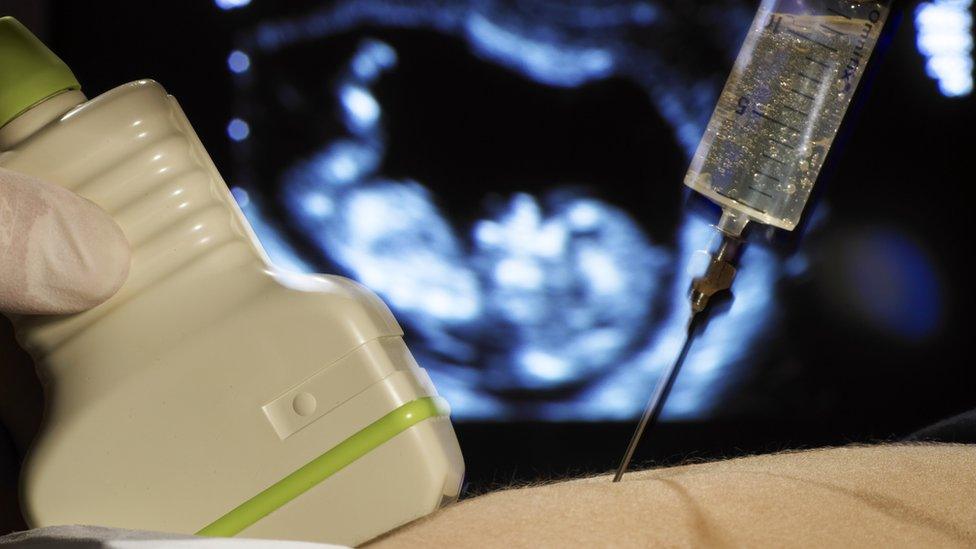Women warned about private Down's syndrome tests
- Published

A more invasive test, that carries a risk of miscarriage, is still needed to make a diagnosis
Pregnant women are being urged to ask questions of private providers offering a new test for Down's syndrome.
The said while many clinics provide a good service, some give too little advice and support.
It says some fail to make it clear that non-invasive prenatal testing (NIPT) can offer only an estimate of Down's risk and is not diagnostic.
One private clinic said counselling was a vital part of the test.
NIPT involves taking a blood sample from the woman to look for DNA from the baby circulating in her blood.
This is how doctors can gauge the risk of possible genetic conditions affecting the baby, such as Down's.
High Street chains
Doctors can also use NIPT to determine a baby's sex. This isn't something NHS England will be advocating when it rolls out the test to high-risk women next year, but it is already big business for some private clinics in the UK.
Most private NIPT providers offer their tests to women through hospitals and healthcare clinics, although some clinics are located in retail chains on High Streets.
NIPT is also available on some websites for women to order directly.
The Nuffield Council, which advises on ethical issues, says the information currently offered to women and couples accessing NIPT outside the NHS can sometimes be poor and incomplete.
It says some providers are not telling women enough about the limits of the test.
Advertising by clinics can fail to point out that NIPT can vary in its accuracy, and that it may give a reading that turns out to be false.
This is important because women use the test result to decide whether to have more risky, invasive diagnostic tests that pose a chance of miscarriage.
The report says there have been instances where the NHS was "left to pick up the pieces" after women had been told that they had a high chance of carrying a baby with a genetic disease based on their NIPT result but had not been given sufficient follow-up.
One woman who used a private testing service told the Nuffield Council: "My results were delivered via a telephone call on a Friday teatime. I was then told if I needed to know more to phone back on Monday. In the meantime arrangements would be made to facilitate a termination."
Support services
Dr Louise Bryant, who helped write the Nuffield Council report, said: "We are concerned that some women are not being supported well enough to make informed decisions."
Judith Pilling, from the private provider This is my: Health Screening & Ultrasound Centres, said trained genetic counsellors should be accessible for patients when queries or concerns arise - something her company offers.
Many groups have welcomed the Nuffield Council report, but some have criticised parts of its content, including a call for a ban on the use of NIPT for determining the sex of an unborn child.
The British Pregnancy Advisory Service said: "We should be absolutely clear that there is no peer-reviewed evidence of sex-selective abortion taking place in the UK.
"Where any woman is under pressure to produce a male child, the ethical answer is not to deny every pregnant woman the right to find out information about her own pregnancy, but to do our utmost to ensure gender equality and access to comprehensive women's support services so that women can make their own choice about their pregnancy free from coercion."
- Published31 October 2016
- Published29 September 2016